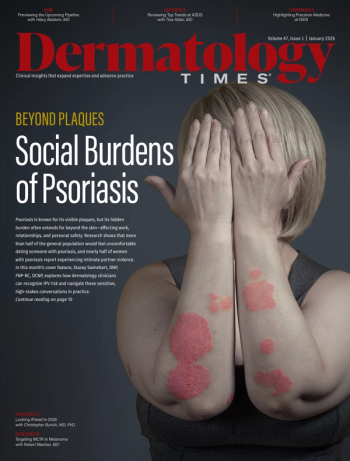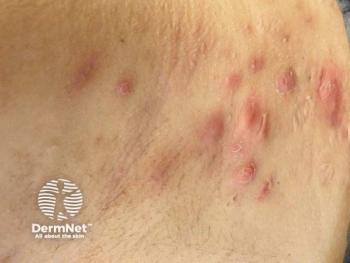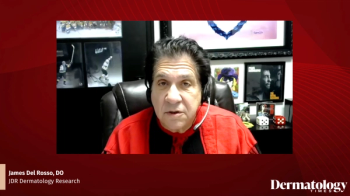
Soligenix and European Medicines Agency Settle on Design of Second Placebo-Controlled Trial of HyBryte in CTCL
The agreement for a second confirmatory trial comes after a successful phase 3 FLASH study that yielded positive outcomes and efficacy.
The study, named FLASH2 (Fluorescent Light Activated Synthetic Hypericin 2), aims to replicate and extend the success of the initial phase 3 trial for HyBryte in this indication, FLASH (
For 6 weeks, participants received treatment of HyBryte or placebo to 3 index lesions on a twice-weekly basis. In the second cycle of the study, all participants received treatment with HyBryte for 6 weeks to index lesions, and in the third cycle, considered optional, all lesions--whether index or additional--received treatment with HyBryte for 6 weeks. After 6 weeks of treatment, researchers found that hypericin was more effective than placebo.2
The FLASH2 trial will adopt a double-blind, placebo-controlled design, similar to its predecessor, with an extension to 18 weeks of continuous treatment. Approximately 80 patients across the United States and Europe will be enrolled, with the primary endpoint assessment conducted at the conclusion of the 18-week period. The extended treatment duration aims to statistically demonstrate HyBryte's efficacy over an extended real-world treatment regimen.
Patients will receive topical HyBryte application twice weekly for 18 weeks, followed by administration of safe, visible light at specified wavelengths. The primary efficacy endpoint will assess treatment response based on the reduction in the modified composite assessment of index lesions severity score.
"In treating CTCL, which is a chronic cancer with no cure, long-term safety is a strong driver of treatment choice. Most current treatment options for CTCL are associated with significant safety concerns, including black-box warnings," said Brian Poligone, MD, PhD, director of the Rochester Skin Lymphoma Medical Group, in a news release.1 "Clinical studies with HyBryte have demonstrated strong and rapid efficacy with a very benign safety profile, with broad applicability across different lesion types, different skin tones and different disease stages. I know I can speak for my colleagues that have been involved with these studies when I say that the data generated to date has been extremely compelling. This second study is very similar to the first FLASH study, and should build on these compelling data, while allowing us to more closely treat as we would in a 'real world' setting. We believe the outcome of this trial will further validate the utility of HyBryte in early-stage CTCL and we look forward to participating in this important study."
Soligenix first shared the positive results from the FLASH study in July of 2022.2 In the time since, Soligenix has also overseen phase 2 development of HyBryte in patients with mild to moderate psoriasis.3
"With its chronic course and major impact on patient quality of life, CTCL is an orphan disease in urgent need of additional treatment options that are well-tolerated and safe over the long term," said Christopher Schaber, PhD, president and chief executive officer of Soligenix, in a news release.1 "Studies to date have indicated a substantial increase in efficacy with longer treatment and similar performance against both patch and plaque lesions. These results are derived from one of the largest studies ever conducted in CTCL, and we believe this second study will both substantiate and improve upon these results."
HyBryte has also received fast track and orphan drug designations from the FDA and orphan drug designation from the European Medicines Agency.
References
- Soligenix announces agreement on the design of a second confirmatory placebo-controlled trial for HyBryte with the European Medicines Agency. News release. PR Newswire. April 3, 2024. Accessed April 3, 2024.
https://www.prnewswire.com/news-releases/soligenix-announces-agreement-on-the-design-of-a-second-confirmatory-placebo-controlled-trial-for-hybryte-with-the-european-medicines-agency-302106263.html - Kim EJ, Mangold AR, DeSimone JA, et al. Efficacy and safety of topical hypericin photodynamic therapy for early-stage cutaneous T-cell lymphoma (mycosis fungoides): The FLASH phase 3 randomized clinical trial. JAMA Dermatol. 2022. Accessed April 2, 2024. doi:10.1001/jamadermatol.2022.2749
- Soligenix Inc. Soligenix announces top-line results of the phase 2a study of SGX302 (synthetic hypericin) in patients with mild-to-moderate psoriasis. PR Newswire: press release distribution, targeting, monitoring and marketing. January 4, 2024. Accessed April 2, 2024.
https://www.prnewswire.com/news-releases/soligenix-announces-top-line-results-of-the-phase-2a-study-of-sgx302-synthetic-hypericin-in-patients-with-mild-to-moderate-psoriasis-302025994.html#:~:text=Synthetic%20hypericin%20or%20HyBryte%E2%84%A2,caused%20by%20malignant%20T%2Dcells
Newsletter
Like what you’re reading? Subscribe to Dermatology Times for weekly updates on therapies, innovations, and real-world practice tips.










